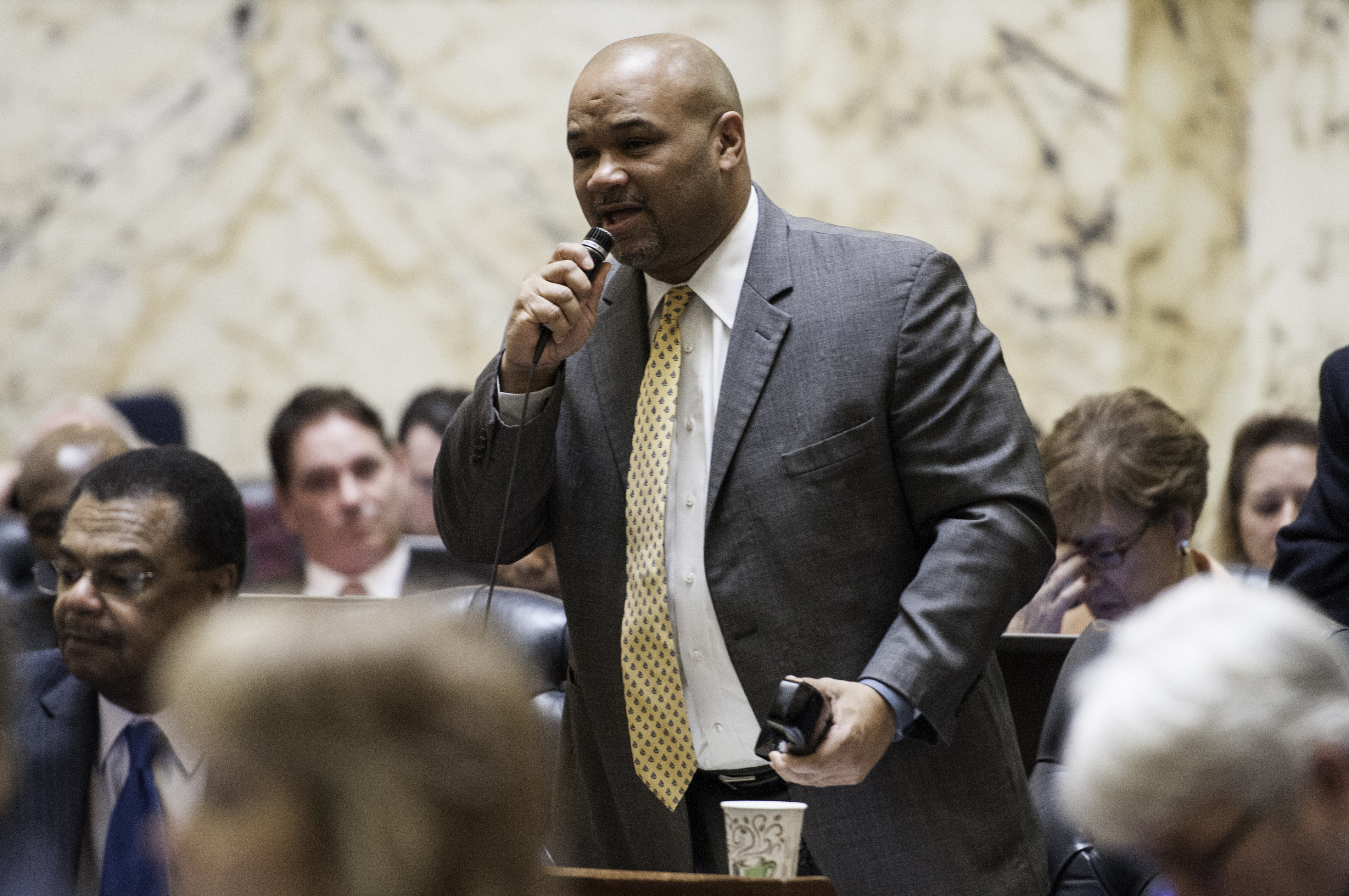By Glynis Kazanjian
For MarylandReporter.com

From left: Champ McCulloch of Md. Associated General Contractors, Sen. Christopher Shank and Sen. Norman Stone
Legislation to require state contractors and some businesses to use the federal E-Verify program got its typically cool reception at a Senate hearing Thursday.
Bills introduced by Baltimore County Democrat Sen. Norman Stone and Washington County Republican Sen. Christopher Shank would prohibit state contractors and businesses using state grants from hiring anyone without checking their immigration status electronically. Employers would be required to participate in E-Verify, a free, federal employment verification program designed to detect illegal immigrants using fraudulent identification credentials.
Stone said the legislation “will help to put unemployed Maryland citizens back to work, will prevent companies with state business from hiring undocumented workers and exploiting them with low wages, and it will protect businesses. Once they have used the E-Verify system, sanctions cannot be imposed even if they mistakenly hire someone who is undocumented,” Stone told the Education, Health and Environmental Affairs Committee.
Champe McCulloch, president of Maryland Associated General Contractors, urged lawmakers to pass the bill.
“We have very large businesses and very small businesses” in his organization, McCulloch said. “What we want more than anything else is a level playing field. Our folks play by the rules. We want a fair shot at state business.”
Committee member Sen. Bill Ferguson, D-Baltimore City, said he opposed the legislation because of potential law suits that could arise. Stone’s bill would permit anyone who believes an employer has hired an unauthorized worker to file a complaint with the attorney general or a state’s attorney.
“My problem with this bill is, as a business you may have to pay to defend yourself if another company says you have illegal aliens working for you,” Ferguson said.
Reading from a Carroll County Chamber of Commerce letter, committee member Sen. Joanne Benson, D-Prince George’s, said she was concerned about E-Verify’s accuracy rate.
“An independent analysis of the E-Verify program by the Government Accounting Office and the Maryland group known as Westat, show that the overwhelming majority of those legally allowed to work in the country are quickly approved, however, a driving market in fake social security numbers means that the program failed to spot many unauthorized aliens,” Benson said.
E-Verify has a 96% accuracy rate among legal workers, according to the Department of Legislative Services. However, a 2009 Westat report found that 54% of unauthorized workers were incorrectly confirmed as being authorized to work.
Implementing E-Verify, which is generally considered nominal in cost, according to the bills’ fiscal notes, could affect employment of future state projects including the proposed light rail Purple Line planned for Montgomery and Prince George’s Counties.
“The Purple Line project is expected to create roughly 3,600 temporary construction jobs per year during the five years of construction,” said Terry Owens, Maryland Transit Administration spokesman.
Current federal law prohibits employers from hiring illegal aliens and employers are required to attempt to verify employment eligibility before hiring anyone, according to the bills.
Maryland’s unemployment rate last December was 7.4 percent, Stone said. “The employment of undocumented workers is certainly a contributing factor to this rate.”
Similar E-Verify legislation was proposed in 2009 and 2010 in both chambers. In 2010, one bill was sent to interim study but got no further.
House Bill 761, identical to the Shank bill and sponsored by Del. Warren Miller, R-Howard, will be heard in the Health and Government Operations Committee on March 16.
Legislators want employers to E-Verify immigration status
By Glynis Kazanjian
For MarylandReporter.com
Legislation to require state contractors and some businesses to use the federal E-Verify program got its typically cool reception at a Senate hearing Thursday.
Bills introduced by Baltimore County Democrat Sen. Norman Stone and Washington County Republican Sen. Christopher Shank would prohibit state contractors and businesses using state grants from hiring anyone without checking their immigration status electronically. Employers would be required to participate in E-Verify, a free, federal employment verification program designed to detect illegal immigrants using fraudulent identification credentials.
Stone said the legislation “will help to put unemployed Maryland citizens back to work, will prevent companies with state business from hiring undocumented workers and exploiting them with low wages, and it will protect businesses. Once they have used the E-Verify system, sanctions cannot be imposed even if they mistakenly hire someone who is undocumented,” Stone told the Education, Health and Environmental Affairs Committee.
Champe McCulloch, president of Maryland Associated General Contractors, urged lawmakers to pass the bill.
“We have very large businesses and very small businesses” in his organization, McCulloch said. “What we want more than anything else is a level playing field. Our folks play by the rules. We want a fair shot at state business.”
Committee member Sen. Bill Ferguson, D-Baltimore City, said he opposed the legislation because of potential law suits that could arise. Stone’s bill would permit anyone who believes an employer has hired an unauthorized worker to file a complaint with the attorney general or a state’s attorney.
“My problem with this bill is, as a business you may have to pay to defend yourself if another company says you have illegal aliens working for you,” Ferguson said.
Reading from a Carroll County Chamber of Commerce letter, committee member Sen. Joanne Benson, D-Prince George’s, said she was concerned about E-Verify’s accuracy rate.
“An independent analysis of the E-Verify program by the Government Accounting Office and the Maryland group known as Westat, show that the overwhelming majority of those legally allowed to work in the country are quickly approved, however, a driving market in fake social security numbers means that the program failed to spot many unauthorized aliens,” Benson said.
E-Verify has a 96% accuracy rate among legal workers, according to the Department of Legislative Services. However, a 2009 Westat report found that 54% of unauthorized workers were incorrectly confirmed as being authorized to work.
Implementing E-Verify, which is generally considered nominal in cost, according to the bills’ fiscal notes, could affect employment of future state projects including the proposed light rail Purple Line planned for Montgomery and Prince George’s Counties.
“The Purple Line project is expected to create roughly 3,600 temporary construction jobs per year during the five years of construction,” said Terry Owens, Mary
Legislators want employers to E-Verify immigration status
By Glynis Kazanjian
For MarylandReporter.com
Legislation to require state contractors and some businesses to use the federal E-Verify program got its typically cool reception at a Senate hearing Thursday.
Bills introduced by Baltimore County Democrat Sen. Norman Stone and Washington County Republican Sen. Christopher Shank would prohibit state contractors and businesses using state grants from hiring anyone without checking their immigration status electronically. Employers would be required to participate in E-Verify, a free, federal employment verification program designed to detect illegal immigrants using fraudulent identification credentials.
Stone said the legislation “will help to put unemployed Maryland citizens back to work, will prevent companies with state business from hiring undocumented workers and exploiting them with low wages, and it will protect businesses. Once they have used the E-Verify system, sanctions cannot be imposed even if they mistakenly hire someone who is undocumented,” Stone told the Education, Health and Environmental Affairs Committee.
Champe McCulloch, president of Maryland Associated General Contractors, urged lawmakers to pass the bill.
“We have very large businesses and very small businesses” in his organization, McCulloch said. “What we want more than anything else is a level playing field. Our folks play by the rules. We want a fair shot at state business.”
Committee member Sen. Bill Ferguson, D-Baltimore City, said he opposed the legislation because of potential law suits that could arise. Stone’s bill would permit anyone who believes an employer has hired an unauthorized worker to file a complaint with the attorney general or a state’s attorney.
“My problem with this bill is, as a business you may have to pay to defend yourself if another company says you have illegal aliens working for you,” Ferguson said.
Reading from a Carroll County Chamber of Commerce letter, committee member Sen. Joanne Benson, D-Prince George’s, said she was concerned about E-Verify’s accuracy rate.
“An independent analysis of the E-Verify program by the Government Accounting Office and the Maryland group known as Westat, show that the overwhelming majority of those legally allowed to work in the country are quickly approved, however, a driving market in fake social security numbers means that the program failed to spot many unauthorized aliens,” Benson said.
E-Verify has a 96% accuracy rate among legal workers, according to the Department of Legislative Services. However, a 2009 Westat report found that 54% of unauthorized workers were incorrectly confirmed as being authorized to work.
Implementing E-Verify, which is generally considered nominal in cost, according to the bills’ fiscal notes, could affect employment of future state projects including the proposed light rail Purple Line planned for Montgomery and Prince George’s Counties.
“The Purple Line project is expected to create roughly 3,600 temporary construction jobs per year during the five years of construction,” said Terry Owens, Maryland Transit Administration spokesman.
Current federal law prohibits employers from hiring illegal aliens and employers are required to attempt to verify employment eligibility before hiring anyone, according to the bills.
Maryland’s unemployment rate last December was 7.4 percent, Stone said. “The employment of undocumented workers is certainly a contributing factor to this rate.”
Similar E-Verify legislation was proposed in 2009 and 2010 in both chambers. In 2010, one bill was sent to interim study but got no further.
House Bill 761 identical to the Shank bill and sponsored by Del. Warren Miller, R-Howard, will be heard in the Health and Government Operations Committee on March 16.
land Transit Administration spokesman.
Current federal law prohibits employers from hiring illegal aliens and employers are required to attempt to verify employment eligibility before hiring anyone, according to the bills.
Maryland’s unemployment rate last December was 7.4 percent, Stone said. “The employment of undocumented workers is certainly a contributing factor to this rate.”
Similar E-Verify legislation was proposed in 2009 and 2010 in both chambers. In 2010, one bill was sent to interim study but got no further.
House Bill 761 identical to the Shank bill and sponsored by Del. Warren Miller, R-Howard, will be heard in the Health and Government Operations Committee on March 16.





Recent Comments